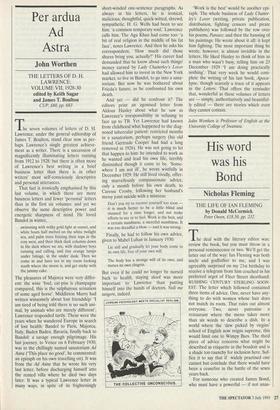Per ardua Ad Astra
John Worthen
THE LETTERS OF D. H. LAWRENCE: VOLUME VII, 1928-30 edited by Keith Sagar and James T. BouIton CUP, £60, pp. 683 he seven volumes of letters of D. H. Lawrence, under the general editorship of James T. Boulton, stand clear now as per- haps Lawrence's single greatest achieve- ment as a writer. There is a succession of magnificently illuminating letters running from 1912 to 1928: but there is often more of Lawrence's best writing in a brief business letter than there is in other writers' most self-consciously descriptive and personal utterances.
That fact is ironically emphasised by this last volume, in which there are more business letters and fewer 'personal' letters than in the first six volumes: and yet we observe the same descriptive power and energetic sharpness of mind. He loved Bandol in winter,
swimming with milky gold light at sunset, and white boats half melted on the white twilight sea, and palm trees frizzing their tops in the rosy west, and their thick dark columns down in the dark where we are, with shadowy boys running and calling, and tiny orange lamps under foliage, in the under dusk. Then we come in and have tea in my room looking south where the moon is, and get sticky with the jammy cake.
The pleasures of Majorca were very differ- ent: the wine 'foul, cat-piss is champagne compared, this is the sulphurous urination of some aged horse'. Middleton Murry had written winsomely about lost friendship: 'I am tired of being told there is no such ani- mal, by animals who are merely different', Lawrence responded tartly. These were the years when he wandered Europe in search of lost health: Bandol to Paris, Majorca, Italy, Baden Baden, Bavaria, finally back to Bandol: a savage enough pilgrimage. His last journey, to Vence on 6 February 1930, was to the chillingly named sanatorium Ad Astra (`This place no good', he commented: an epitaph on his own travelling on). It was from the Ad Astra that he wrote his very last letter, before discharging himself into the rented villa where he died two days later. It was a typical Lawrence letter in many ways, in spite of its frighteningly short-winded one-sentence paragraphs. As always in his letters, he is ironical, malicious, thoughtful, quick-witted, shrewd, sympathetic. H. G. Wells had been to see him: 'a common temporary soul,' Lawrence calls him. The Aga Khan had come too: 'a bit of real religion in the middle of his fat face', notes Lawrence. And then he asks his correspondent, 'How much did those shares bring you, actually?' His career had demanded that he know about such things! money earned by Lady Chatterley's Lover had allowed him to invest in the New York market, to live in Bandol, to go into a sana- torium. But now he was bothered about Frieda's future, as he confronted his own death.
And yet — did he confront it? The editors print an agonised letter from Aldous Huxley about what he saw as Lawrence's irresponsibility in refusing to face up to TB. Yet Lawrence had known from childhood what happened to the diag- nosed tubercular patient: restricted months in a sanatorium, perhaps surgery (his old friend Gertrude Cooper had had a lung removed in 1926). He was not going to let that happen to him: he intended to work as he wanted and lead his own life, terribly diminished though it came to be. 'Some- where I am not ill', he wrote wistfully in December 1929. He still lived vividly, offer- ing marvellously compassionate advice, only a month before his own death, to Caresse Crosby, following her husband's messy joint suicide with a mistress:
Don't you try to recover yourself too soon — it is much better to be a little blind and stunned for a time longer, and not make efforts to see or to feel. Work is the best, and a certain numbness, a merciful numbness. It was too dreadful a blow — and it was wrong.
Finally, he had to follow his own advice, given to Mabel Luhan in January 1930:
Lie still and gradually let your body come to its own life, free of your own will.
The body has a strange will of its own, and nurses its own chagrin.
But even if he could no longer be nursed back to health, staying aloof was more important to Lawrence than putting himself into the hands of doctors. Noll me tangere, indeed. 'Work is the best' would be another epi- taph. The whole business of Lady Chatter- ley's Lover (writing, private publication, distribution, fighting censors and pirate publishers) was followed by the row over his poems, Pansies: and then the banning of his paintings. He wrote about it all: it kept him fighting. The most important thing he wrote, however, is almost invisible in the letters. He liked Huxley to think of him as a man who wasn't busy, telling him on 23 December 1929 'I am doing practically nothing'. That very week he would com- plete the writing of his last book, Apoca- lypse, though scarcely a trace of it appears in the Letters. That offers the reminder that, wonderful as these volumes of letters are — simply, authoritatively and beautiful- ly edited — there are stories which even they cannot contain.
John Worthen is Professor of English at the University College of Swansea.


















































 Previous page
Previous page